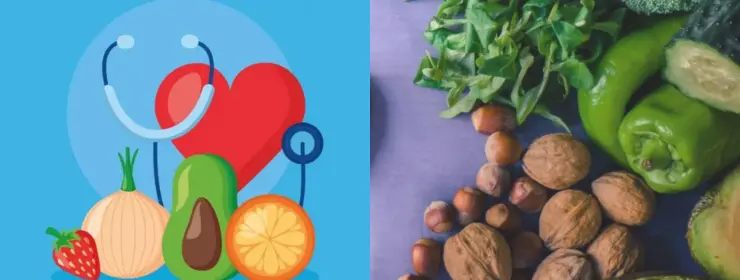
Introduction:
A heart-healthy diet is not just a means of satisfying hunger; it's a fundamental cornerstone for cardiovascular well-being. The food choices we make play a pivotal role in shaping the health of our hearts, influencing factors such as cholesterol levels, blood pressure, and overall cardiac function. In this comprehensive blog post, we will explore essential tips for cultivating a heart-healthy diet that nourishes both body and soul.
Understanding the Basics:
Before we delve into specific tips, it's crucial to understand the foundational principles of a heart-healthy diet. Dr. Vinod Kumar K, a distinguished interventional cardiologist, emphasizes the significance of balanced nutrition.
A heart-healthy diet is one that focuses on:
Fruits and Vegetables:
Abundant in vitamins, minerals, and antioxidants, fruits and vegetables are essential components of a heart-healthy diet. They contribute to lowering blood pressure, reducing inflammation, and supporting overall heart health.
Whole Grains:
Opting for whole grains over refined grains ensures a higher intake of fiber, which aids in managing cholesterol levels and promoting digestive health. Quinoa, brown rice, and oats are excellent choices.
Lean Proteins:
Including lean protein sources such as fish, poultry, legumes, and nuts provides essential amino acids without the saturated fat found in red meat. Fish rich in omega-3 fatty acids, like salmon, can have additional heart benefits.
Healthy Fats:
Dr. Vinod Kumar K stresses the importance of incorporating healthy fats, such as those found in avocados, olive oil, and nuts. These fats contribute to improved cholesterol profiles and cardiovascular health.
Limiting Sodium and Added Sugars:
Monitoring sodium intake helps control blood pressure, while minimizing added sugars contributes to weight management and reduces the risk of diabetes and heart disease.
Tips for a Heart-Healthy Diet:
Color Your Plate:
Vibrant and colorful fruits and vegetables provide a spectrum of essential nutrients. Dr. Vinod Kumar K recommends aiming for a variety of colors to ensure a diverse range of health-promoting compounds.
Portion Control:
Moderation is key. Dr. Vinod Kumar K advises paying attention to portion sizes to avoid overeating. Be mindful of hunger and fullness cues, and consider using smaller plates to help with portion control.
Choose Whole Foods:
Opt for whole, unprocessed foods whenever possible. Whole foods retain more nutrients and are often lower in added sugars, sodium, and unhealthy fats compared to processed alternatives.
Prioritize Omega-3 Fatty Acids:
Dr. Vinod Kumar K highlights the importance of omega-3 fatty acids, found in fatty fish, chia seeds, flaxseeds, and walnuts. These essential fats contribute to heart health by reducing inflammation and supporting optimal cholesterol levels.
Mindful Eating:
Eating with awareness and savoring each bite can lead to better digestion and satisfaction. Dr. Vinod Kumar K encourages mindful eating to foster a healthy relationship with food.
Hydration Matters:
Staying well-hydrated is crucial for overall health. Dr. Vinod Kumar K suggests opting for water, herbal teas, and other low-calorie beverages to support hydration without added sugars.
Limit Processed Foods:
Processed foods often contain high levels of sodium, added sugars, and unhealthy fats. Dr. Vinod Kumar K recommends minimizing the intake of processed and packaged foods for better heart health.
Cook at Home:
Cooking meals at home allows for greater control over ingredients and preparation methods. Dr. Vinod Kumar K encourages experimenting with heart-healthy recipes and incorporating a variety of flavors into your home-cooked meals.
Include Fiber-Rich Foods:
High-fiber foods, such as whole grains, legumes, fruits, and vegetables, contribute to heart health by promoting satiety, supporting digestion, and helping manage cholesterol levels.
Read Food Labels:
Dr. Vinod Kumar K advises paying attention to food labels to identify hidden sugars, unhealthy fats, and excessive sodium. Being informed about the nutritional content of packaged foods facilitates better food choices.
Conclusion:
In conclusion, adopting a heart-healthy diet is a powerful investment in cardiovascular well-being. Dr. Vinod Kumar K's expert tips provide a roadmap for making informed and intentional food choices that nourish the heart and support overall health. By incorporating these principles into daily eating habits, individuals can take proactive steps towards cultivating a heart-healthy lifestyle that promotes vitality and longevity. Remember, a nourished heart is a resilient heart.
About the Author - Dr. Vinod Kumar K:
Dr. Vinod Kumar K, a distinguished cardiologist, holds key qualifications: MBBS, MD in Internal Medicine, and DM in Cardiology from Jayadeva Institute. Specializing in interventional cardiology, his expertise encompasses procedures like coronary angioplasty and peripheral angioplasty. With a commitment to advancing cardiovascular care, Dr. Vinod Kumar K stands as a trusted authority in the field.
Recent Posts
"Navigating the Cholesterol Maze: Practical Tips for Improvement"

"Savor the Season: A Guide to Healthy Summer Foods for a Happy Heart"

Winter Wellness: Staying Active When the Weather Gets Cold

"Embarking on a Heartfelt Journey: Embrace Goals for a Healthy Heart"

Decoding Genetics: Navigating the Complex Landscape of Heart Disease Risk"

Guarding Your Arteries: Dr. Vinod Kumar K's Guide to Preventing Peripheral Artery Disease

